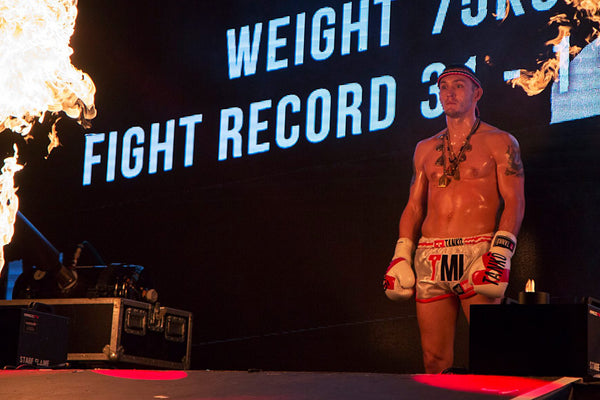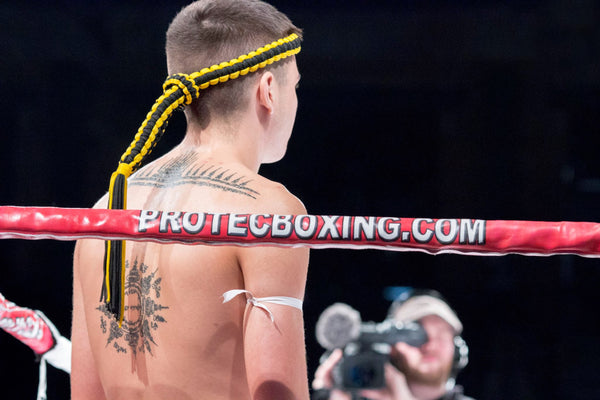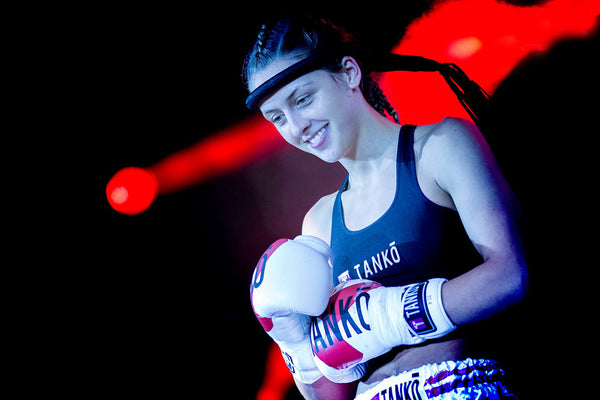
How to Cope with Pressure and Performance Anxiety in Combat Sports
Through my #InsideChat podcast, I am able to personally speak with a wide range of leading figures from the world of martial arts, sports, psychology, sociology and nutrition on a regular basis. One such individual I had the pleasure of speaking to and learning from recently is top UK sports psychology researcher, Dr Sarah Williams of the university of Birmingham. In this particular episode, we spoke about how to cope with pressure and performance anxiety in combat sports.
How athletes perceive and respond to stressors can make or break their performance and progression. In this extensive blog post written up from this talk, we’ll explore evidence-based strategies coaches, fighters, and parents can apply to help transform pressure into enhanced performance.

We’ll uncover best practices for regulation, resilience, and growth in the face of demanding situations. Core topics include:
- Redefining pressure and anxiety as performance enhancers
- Fostering optimal mindsets through empowering coaching
- Developing mental skills and pre-performance routines
- Using imagery to regulate stress, build confidence, and prepare
- Creating individualized competition simulations and coping plans
- Providing the right parental support for youth athletes
- Tailoring strategies across ability levels and contexts
This post aims to equip those involved in Martial Arts, Boxing, MMA and other Combat Sport disciplines with actionable advice to master pressure, hone mental toughness, and fulfil potential.
How to Cope with Pressure and Performance Anxiety
Reframing Pressure & Anxiety as Performance Enhancers
The first paradigm shift is reconsidering anxiety and pressure as potentially positive forces rather than solely obstacles to overcome. Dr. Williams explains that the demands of competition naturally elicit a stress response - increased anxiety, elevated heart rate, sweaty palms, butterflies, etc. Traditionally these symptoms are seen negatively as signs of weakness.
But the truth is feeling some pressure and nervousness is normal and often enhances performance compared to being totally relaxed. Stress mobilises helpful mental and physical activation to rise to the demands at hand. The key is viewing these responses as getting you psyched up to perform rather than panicking about them.

This reflects the idea that anxiety becomes problematic when athletes interpret the accompanying sensations and emotions as debilitating. If seen as the body's way of preparing itself, athletes can harness stress for sharper focus, faster reaction times, and extra adrenaline to power through challenges. Reframing pressure as a tool rather than enemy is the critical first step.
Creating an Empowering Climate Through Coaching
Coaches play a pivotal role in shaping how athletes view and respond to pressure. An empowering coaching style revolves around open communication, education, and teaching strategies rather than criticism or control. Dr. Williams highlights the importance of normalising anxiety and helping athletes redefine it as facilitative.
Rather than reprimanding signs of nerves, coaches should explain this is a natural response reflecting that the athlete cares about performing well. Labelling pressure as "good stress" relieves self-judgement and prevents athletes from spiralling into panic. Coaches can boost confidence in their ability to harness anxiety by instilling perspective and focusing on controllable actions, not outcomes like winning.
Developing Personalised Mental Skills & Routines
Equipping athletes with mental skills promotes self-regulation and resilience in pressurised situations. Dr. Williams notes that techniques like imagery, self-talk, concentration, and relaxation can be tailored to each athlete's needs and integrated regularly into training.
The goal is learning to monitor thoughts, emotions, and anxiety symptoms - not eliminate them entirely. Coaches play a key role in making mental skills training a consistent priority, not an afterthought. Athletes can experiment to find which skills (e.g. cue words, visualisation of successful performances, breathing exercises) optimise their mindset and focus for competition.
Over time, these can be honed into pre-performance routines athletes rely on to get in the zone. Using mental skills in high-stakes training scenarios also develops confidence they'll work when it matters most. While general principles apply, coaches must collaborate with athletes to personalise approaches.
Harnessing Imagery to Regulate Stress & Enhance Performance
Imagery, also known as visualisation, is a particularly powerful tool. Dr. Williams explains athletes can use imagery both to control anxiety and perfect skills/strategies. Imagining successful execution of techniques and combinations boosts confidence they can replicate this in the ring or cage. Visualising effective responses to challenges builds resilience and readiness through "mental rehearsal".

Athletes can also leverage imagery to get in the ideal mindset. Some benefit from picturing feeling confident, calm and in control. Others imagine their body surging with excitement and adrenaline right before competition. Dr. Williams emphasises imagery's effectiveness stems from tailoring it to each athlete's needs and desires. Experimentation uncovers which types of imagery unlock optimal anxiety regulation, focus and performance for a given individual.
Simulating Competition Demands in Training
Training can also simulate the pressures of real competition through "what if" scenarios. Coaches have athletes practice responding to hypothetical challenges like falling behind on points or an opponent landing surprise strikes. Going through game plans and coping strategies in imagined situations prepares athletes mentally to better handle adversity.

Dr. Williams suggests making practice as competition-like as feasible by raising stakes and introducing spectators. Getting accustomed to dealing with pressure in training builds confidence and leads to less marked stress responses when the environment is recreated in a real match. It minimizes uncertainty and allows refinement of pre-performance routines. The more competition variables are simulated, the more transfers to actual performances.
Providing Developmentally-Appropriate Parental Support
For youth combat sport athletes learning how to cope with pressure and performance anxiety, parental support is paramount. But Dr. Williams cautions that well-meaning parents sometimes inadvertently increase pressure on kids to perform by imposing their own expectations. It's crucial to communicate unconditional acceptance regardless of results.
She advises focusing young athletes on intrinsic goals like skill development, enjoyment, and effort rather than outcomes they can't fully control. Parents should create a supportive motivational climate at home that complements what coaches establish in the gym. Openly discussing anxiety and framing pressure as helpful prepares youth to thrive.
Parents can only support strategies suitable to the child's age and maturity. While tailored imagery and self-talk may work for some adolescents, just reinforcing effort and providing comfort is more appropriate for younger kids if upset or discouraged. As youth progress, they can gradually assume more responsibility for applying mental skills with parental guidance.
Tailoring Strategies Across Sport Levels
While fundamentals remain constant, optimising pressure responses requires tailoring strategies to athletes' level of experience. Novice competitors lack reference points, so focusing on gaining experience and minimizing outcome expectations helps manage anxiety. Reminding them pressure enhances performance can alleviate concerns.

Meanwhile, elite athletes convert nerves into an ideal intensity through extensive competition exposure. Their confidence stems from a proven record of delivering under pressure. With mental skills honed through repetition, top athletes smoothly activate optimal arousal and focus. If things go awry, tactical adaptations quickly get them back on track.
So while novices need to build basic familiarity and perspective, veterans combine experience and preparation to reliably perform in the clutch. Coaches must align training priorities and techniques with each athlete's developmental needs on their pressure response journey.
Watch and Listen to the full podcast between myself and Dr Sarah Williams below
Surviving First Competitions: Key Recommendations
For those new to competition, Dr. Williams provides the following tips to alleviate anxiety:
- Reframe responses like increased heart rate as your body preparing to perform at its peak.
- Focus on gaining experience and learning rather than winning - this initial competition is about dipping your toe in the water.
- Remind yourself the pressure is actually on your more experienced opponent to secure the expected win.
- Avoid overthinking by adhering to a pre-planned fight strategy and "what if" coping scenarios.
- Imagine feeling confident and in control to prepare for managing nerves.
- Trust your preparation and know you cannot fail if you give your maximal effort.
Takeaways for Coaches, Fighters & Parents
Here are some final key takeaways when it comes to mastering pressure:
Coaches:
- Explain pressure responses as normal and helpful - this calms athletes and prevents spiralling fear.
- Make mental skills training a regular priority equally essential as physical conditioning.
- Collaborate with athletes to personalise strategies that optimise their mindset and focus.
- Use competition simulations to progressively expose athletes to handling pressure.
Fighters:
- Reframe anxiety as your body's way of mobilising your best performance.
- Consistently practice mental skills like imagery, self-talk and breathing exercises.
- Identify your ideal intensity and pathway to get in the zone before fights.
- Mentally rehearse responding effectively to challenges that may arise.
Parents:
- Ensure kids participate in sports they enjoy without pressuring wins.
- Discuss anxiety openly and reinforce effort rather than results.
- Provide unconditional support regardless of competitive outcomes.
- Help children focus on intrinsic goals and developing at their own pace.
Pressure is guaranteed in combat sports, but perceived obstacles can be transformed into opportunities for growth. An empowering motivational climate provides the foundation. Tailored mental skills training equips athletes to optimise mindset and focus, and aids in the development of learning how to cope with pressure and performance anxiety.
Imagery enhances preparation, confidence and resilience. Simulated competition experiences build readiness. When pressure is reframed as a tool rather than adversary, athletes can channel it to rise to their greatest challenges.
Related Content
If you enjoy this article on How to Cope with Pressure and Performance Anxiety in Combat Sports then you may well love Motivating Fighters and Developing Mental Toughness in Martial Arts and Combat Sports or 19 Ways to Become a World Champion in Coaching Martial Arts and Combat Sports as already featured on this site.
Warrior Marketplace
Here, you can also learn more about all of the other exceptional exceptional Muay Thai, Kickboxing, Boxing, Karate and Taekwondo Instructional Volumes featured on the Warrior Collective!
Thanks for reading, I hope you enjoyed reading this article on How to train Muay Thai on your own without a coach or training partner, please like, share and don't forget to subscribe to the Warrior Collective Youtube Channel for great training videos each week!!
Keep up to date with the Warrior Collective
